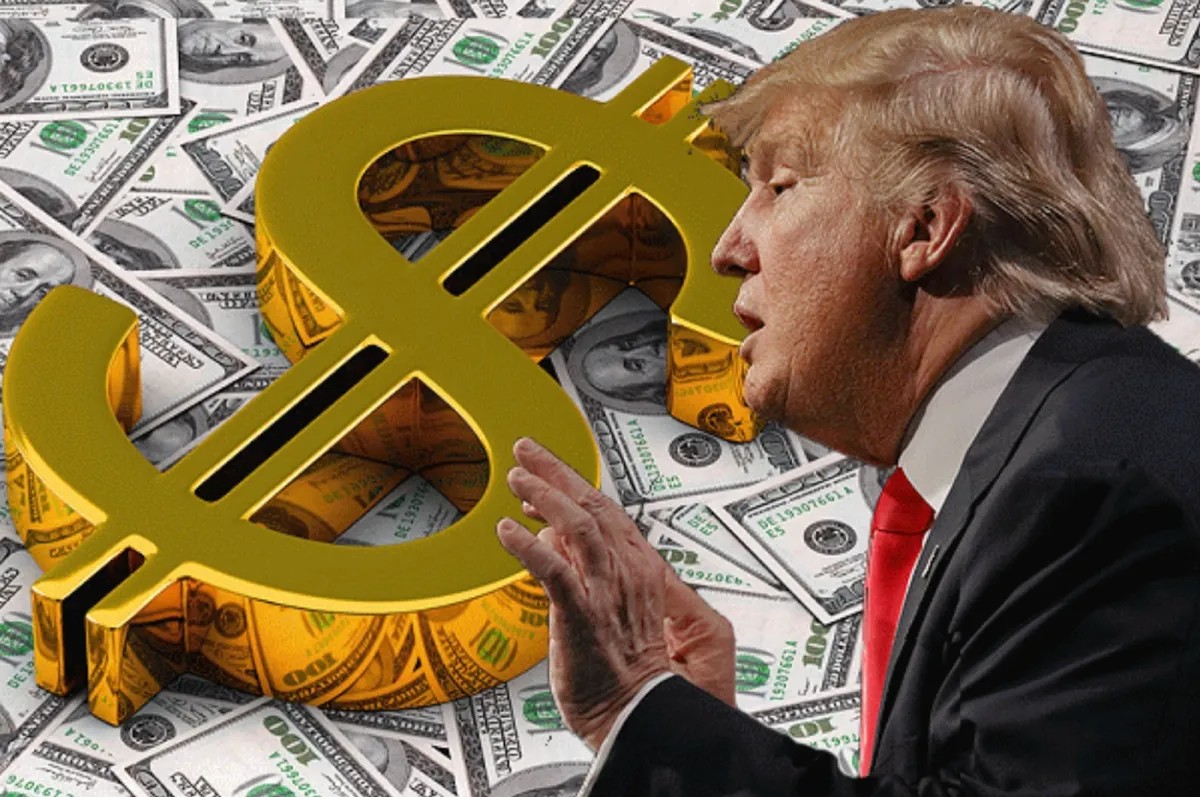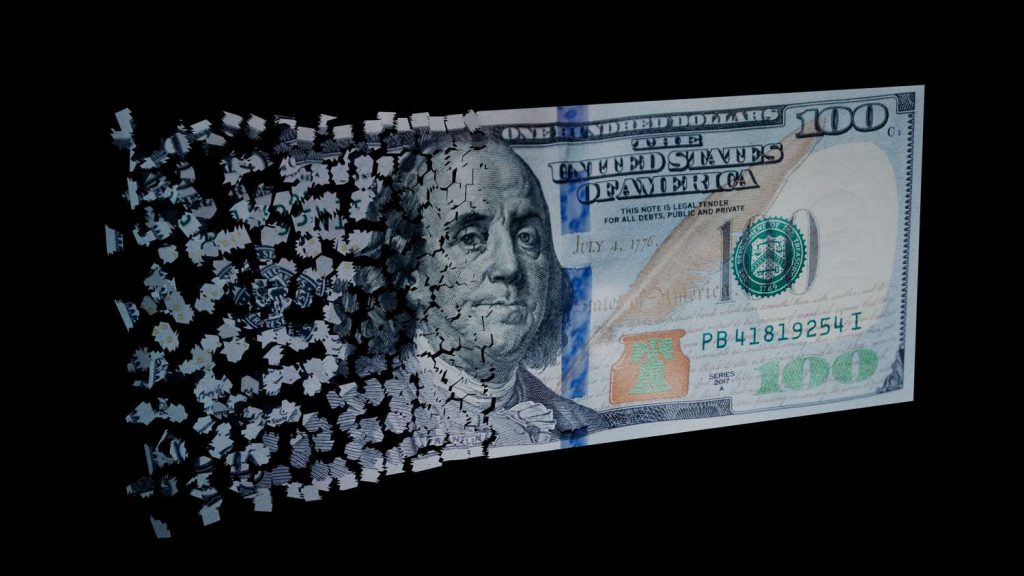De-dollarization Threat: Trump’s Moves Could Completely Erode Dollar Power

Trump’s economic policies have made de-dollarization threats much more severe as his administration works to diminish the dollar’s traditional global financial dominance. At the moment of writing, the dollar’s status as the world’s reserve currency faces accelerated decline because of the April 2 2025 aggressive tariff announcement and other controversial actions taken by the Trump administration.
Also Read: Ripple (XRP) Investment Analysis For 2025, 2026, 2030, & Beyond
The Impact of Trump’s Tariffs, Global Trade Disruptions, and the Dollar’s Decline

Trump’s Tariff Strategy Undermines Dollar Stability
Trump’s new tariffs targeting U.S. trading partners have created unprecedented global trade disruption. Financial experts view this de-dollarization policy as an attempt at weaponizing economic advantages, which could lead to serious consequences.
Edward Fishman, Gautam Jain, and Richard Nephew stated:
“Combined with Trump’s attacks on the rule of law, his clumsy, erratic attempts to weaponize Washington’s economic advantages pose the greatest threat so far to the dollar’s status as a reserve currency.”
The dollar initially strengthened as interest rates rose, but such market uncertainty has since contributed to a significant dollar decline against major currencies, and also created volatility in financial markets worldwide.
Allies Face Harsher Treatment
The current tariff structure penalizes U.S. allies more severely than adversaries, which has damaged trust in U.S. economic leadership. This de-dollarization Trump approach threatens traditional currency reserve relationships that have existed for decades.
Also Read: Goldman Sachs Predicts $3,700 Gold by Year-End Surge
Sanctions Push Nations Toward Alternatives
At the time of writing, as Trump ramps up pressure against Iran and Venezuela, more countries under sanctions feel motivated to reduce dollar reliance. China’s Cross-Border Interbank Payment System (CIPS) offers an alternative to SWIFT for international transactions amid growing global trade disruption and uncertainty in world markets.
Rule of Law Concerns
Perhaps the greatest threat to dollar dominance comes from challenges to the rule of law. “De-dollarization Trump policies risk eroding foreign investor confidence in dollar-denominated assets, which investors have historically considered extremely safe investments.
Potential Consequences
Fishman, Jain, and Nephew warned:
“The result of the dollar’s decline will be higher costs, more complicated trade, and reduced living standards—at least until another currency comes along to replace it.”
They further concluded:
“Choices, not destiny, determine reserve currencies; if the dollar is finally dethroned, it will be a disaster of the Trump administration’s own making.”
Also Read: Japan’s $1.1 Trillion in U.S. Treasuries: A New Weapon in Economic Warfare
The historical precedent of the British pound’s decline demonstrates that currency reserve status can indeed be lost through economic and political missteps, making de-dollarization threats from Trump’s policies a genuine concern for dollar decline and global economic stability.
Read More

A 165% Rally, a 2,000% Volume Spike, and a $6.4B Deal: Inside the Cronos (CRO) Breakout
De-dollarization Threat: Trump’s Moves Could Completely Erode Dollar Power

Trump’s economic policies have made de-dollarization threats much more severe as his administration works to diminish the dollar’s traditional global financial dominance. At the moment of writing, the dollar’s status as the world’s reserve currency faces accelerated decline because of the April 2 2025 aggressive tariff announcement and other controversial actions taken by the Trump administration.
Also Read: Ripple (XRP) Investment Analysis For 2025, 2026, 2030, & Beyond
The Impact of Trump’s Tariffs, Global Trade Disruptions, and the Dollar’s Decline

Trump’s Tariff Strategy Undermines Dollar Stability
Trump’s new tariffs targeting U.S. trading partners have created unprecedented global trade disruption. Financial experts view this de-dollarization policy as an attempt at weaponizing economic advantages, which could lead to serious consequences.
Edward Fishman, Gautam Jain, and Richard Nephew stated:
“Combined with Trump’s attacks on the rule of law, his clumsy, erratic attempts to weaponize Washington’s economic advantages pose the greatest threat so far to the dollar’s status as a reserve currency.”
The dollar initially strengthened as interest rates rose, but such market uncertainty has since contributed to a significant dollar decline against major currencies, and also created volatility in financial markets worldwide.
Allies Face Harsher Treatment
The current tariff structure penalizes U.S. allies more severely than adversaries, which has damaged trust in U.S. economic leadership. This de-dollarization Trump approach threatens traditional currency reserve relationships that have existed for decades.
Also Read: Goldman Sachs Predicts $3,700 Gold by Year-End Surge
Sanctions Push Nations Toward Alternatives
At the time of writing, as Trump ramps up pressure against Iran and Venezuela, more countries under sanctions feel motivated to reduce dollar reliance. China’s Cross-Border Interbank Payment System (CIPS) offers an alternative to SWIFT for international transactions amid growing global trade disruption and uncertainty in world markets.
Rule of Law Concerns
Perhaps the greatest threat to dollar dominance comes from challenges to the rule of law. “De-dollarization Trump policies risk eroding foreign investor confidence in dollar-denominated assets, which investors have historically considered extremely safe investments.
Potential Consequences
Fishman, Jain, and Nephew warned:
“The result of the dollar’s decline will be higher costs, more complicated trade, and reduced living standards—at least until another currency comes along to replace it.”
They further concluded:
“Choices, not destiny, determine reserve currencies; if the dollar is finally dethroned, it will be a disaster of the Trump administration’s own making.”
Also Read: Japan’s $1.1 Trillion in U.S. Treasuries: A New Weapon in Economic Warfare
The historical precedent of the British pound’s decline demonstrates that currency reserve status can indeed be lost through economic and political missteps, making de-dollarization threats from Trump’s policies a genuine concern for dollar decline and global economic stability.
Read More

